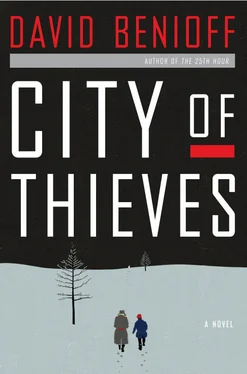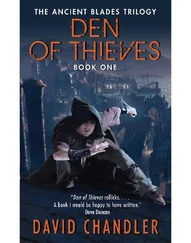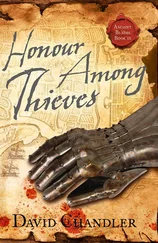Kolya slapped my back and gave me a lewd grin, as if he had stared right through my glass skull.
“Remarkable girl, wasn’t she? You’d like to take a shot at that?”
I said nothing, but Kolya seemed long practiced at carrying on one-sided conversations.
“The secret to winning a woman is calculated neglect.”
“What?”
“Ushakovo. It’s a line from The Courtyard Hound . Oh wait, you never read The Courtyard Hound .” Kolya sighed, weary of my great ignorance. “Your father was a member of the literati and he left you illiterate. A little sad.”
“Why don’t you shut up about my father?”
“Radchenko, the protagonist, is a great lover. People come from all over Moscow to get his advice on wooing. He never leaves his bed, he just lies there, drinking tea—”
“Like Oblomov.”
“Nothing like Oblomov! Why does everyone always say, ‘Like Oblomov’?”
“Because it sounds exactly like Oblomov.”
Kolya stopped walking and looked down at me. He was taller by a head and twice as broad in the shoulders, and he loomed over me now, threatening with his eyes.
“Every university fool knows Goncharov wasn’t half the writer Ushakovo was. Oblomov is nothing. Oblomov is a morality lesson for the bourgeoisie, a little trifle you make your kids read so they don’t grow up lazy. Now, Radchenko—Radchenko is one of the great heroes of the language. Him and Raskolnikov and Bezukhov and, I don’t know, Chichikov, maybe.”
“You’re spitting on me.”
“Well, you deserve to be spat on.”
I continued walking south and Kolya, irritated as he was, soon fell into stride. Fate had shoved us together, that seemed beyond argument. Until Thursday, we were married.
Across the snow-dusted ice of the Neva the golden angel still sat atop the gilded spire of the Peter and Paul Cathedral even though people said the Wehrmacht had promised an Iron Cross to the artilleryman who knocked it down. Kolya gestured toward the Petrograd Side with his chin.
“I was stationed at the fortress when the zoo was bombed.”
“I heard there were baboons running around the city, and a Siberian tiger—”
“That’s a fairy tale,” he said. “None of them got out.”
“Maybe a few did. How do you know?”
“None of them got out. If you want to tell yourself something sweet to help you sleep, go ahead, but it’s a lie.” He spat on the ground. “Fritz burned the whole place to the ground. Betty the elephant… I loved that elephant. I’d go look at her all the time when I was a kid. The way she washed, sucking up water in her trunk and showering herself… She was graceful. You wouldn’t think so, she was so damned big, but she was.”
“She died?”
“What did I just tell you? They all died. Took Betty hours, though. The way she moaned… I was on guard duty and all I wanted to do was run over and shoot her in the heart. Just end it. You never want to hear an elephant dying.”
It was a long walk to the Haymarket, six kilometers maybe, over the Liteiny Bridge, past the Summer Gardens where the elms and the oaks had been hacked down with hatchets, past the Church on Spilled Blood, with its glazed tile facade and soaring onion domes, built on the spot where Hryniewiecki splattered himself and the emperor. The farther south we walked, the more crowded the streets; everyone bundled in three layers, leaning into the wind as they walked, their faces pinched and wasted and pallid from lack of iron. On Nevsky Prospekt all the shops had been closed for months. We saw two women in their sixties walking very close together, their shoulders touching, eyes on the sidewalk looking for the patch of ice that could kill them. A man with a glorious walrus mustache carried a white bucket filled with black nails. A boy, no more than twelve, tugged a sled with a length of rope. A small body wrapped in blankets lay on the sled, a bloodless bare foot dragging along the hard-packed snow. Dragon’s teeth studded the street, reinforced concrete blocks arrayed in rows to hinder the movement of enemy tanks. A printed sign on the wall read WARNING! THIS SIDE OF THE STREET IS THE MOST DANGEROUS DURING THE BOMBING.
Nevsky before the war was the heart of the city, built to rival the grand promenades of London and Paris, sidewalk kiosks hawking cherry blossoms and chocolates, the aproned old men behind the counter in Eliseyev’s slicing smoked sturgeon and sable, the clock tower of city hall rising above all the clamor, letting everyone know how late they were for whatever came next. Black Packards would whip past, horns blaring, carrying Party members from one meeting to another. Even if you had no money to buy anything and nowhere important to go, Nevsky was always a good place to walk. In June the sun didn’t set till midnight and nobody wanted to waste the light. You could watch the prettiest girls in Piter staring through the bright windows of the fancy shops, their eyes appraising the newest dresses for sale, studying the cut so they could make the dress at home if they managed to snatch enough material from work. Even if you never said anything to these girls, even if you always watched from a distance—
“You’re a virgin, aren’t you,” said Kolya, interrupting my thoughts with such eerie timing it startled me.
“Me?” I asked, stupidly. “What are you talking about?”
“I’m talking about the fact that you’ve never had sex.” Sometimes you know there’s no point in lying; the game is over before it’s begun.
“What do you care?”
“Listen, Lev, what if we try to be friends? What do you think about that? We’re going to be together until we find these eggs, we might as well get along, right? Now, you seem like an interesting boy, a bit ornery, a bit moody in the Jewish way, but I like you. And if you weren’t so fucking resistant all the time, I could probably teach you something.”
“About girls?”
“About girls, yes. About literature. About chess.”
“What are you, nineteen? How come you always talk like you’re such an expert at everything?”
“I’m twenty. And I’m not an expert at everything. Just girls, literature, and chess.”
“That’s all.”
“Mm. And dancing. I’m an excellent dancer.”
“What do you want to bet on a game of chess?”
Kolya glanced at me and smiled. He exhaled, his breath rising in vapor above his head.
“I’ll take that German knife of yours.”
“And what do I get?”
“You won’t get anything. You’re not going to win.”
“But let’s say I do.”
“I’ve got maybe another hundred grams of that sausage—”
“Hundred grams of sausage for a German pilot’s knife? I don’t think so.”
“I have some pictures….”
“What kind of pictures.”
“Pictures of girls. French girls. You’d learn things you need to learn.”
Pictures of French girls seemed like a prize worth playing for. I wasn’t worried about losing the knife. There were plenty of people in Piter who could beat me at chess, but I knew all their names. My father had been city champion when he was still in university; he used to take me with him on Thursdays and Sundays to the Spartak Chess Club at the Palace of the Pioneers. When I was six, the club coach declared me a talent. For several years I was one of the top-ranked young players, winning little ribbons and medals at tournaments throughout Leningrad Oblast. This made my father proud, though he was too much of a bohemian to admit to caring about competitions and he never let me display my prizes in our apartment.
When I was fourteen, I quit the club. I had learned that I was a good player but would never be a great one. Friends of mine at Spartak, whom I had beaten consistently when we were younger, had left me far behind, advancing to a plane I could not access no matter how many games I played, how many books I read, how many endgame problems I worked on in bed at night. I was like a well-trained pianist who knows which notes to hit but can’t make the music his own. A brilliant player understands the game in a way he can never quite articulate; he analyzes the board and knows how to improve his position before his brain can devise an explanation for the move. I didn’t have the instincts. Quitting the club disappointed my father, but I wasn’t sad about it. Chess became far more fun once I no longer had to worry about my citywide ranking.
Читать дальше












